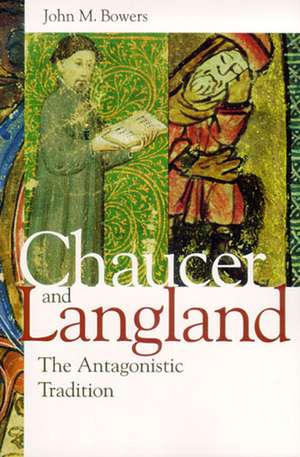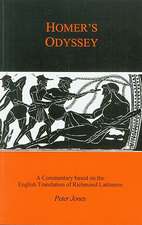Chaucer and Langland – The Antagonistic Tradition
Autor John M. Bowersen Limba Engleză Paperback – 30 apr 2007
"The twentieth turned out not to have been the century of Deleuze, after all, but the fourteenth still could become the century of Langland. In a series of seemingly counterintuitive, yet deeply resourceful, readings, Bowers compellingly reorganizes medieval and early modern English literary history around the dual figures of Chaucer and Langland. He shows not only how an account of Langland and his readers is indispensable to a full understanding of the emergence of English literature, but that the complex literary afterlife of the fourteenth century is already inscribed in the heterogeneous beginnings of Piers Plowman. This is an important corrective to the comparative neglect of Langland in recent years." -D. Vance Smith, Princeton University
"John Bowers has produced what is in many ways an admirable and ambitious volume of new literary history. He makes what could truly be called a master narrative by pushing to extremes the tendencies and implications of recent scholarship. This ingenious work will provoke thought, citation, and occasional outrage." -David Lawton, Washington University
Although Geoffrey Chaucer and William Langland together dominate fourteenth-century English literature, their respective masterpieces, The Canterbury Tales and Piers Plowman, could not be more different. While Langland's poem was immediately popular and influential, it was Chaucer who stood at the head of a literary tradition within a generation of his death. John Bowers asks why and how Chaucer, not Langland, was granted this position. His study reveals the political, social, and religious factors that contributed to the formation of a literary canon in fourteenth-century England.
Preț: 362.32 lei
Nou
Puncte Express: 543
Preț estimativ în valută:
69.34€ • 72.12$ • 58.03£
69.34€ • 72.12$ • 58.03£
Carte tipărită la comandă
Livrare economică 14-28 martie
Preluare comenzi: 021 569.72.76
Specificații
ISBN-13: 9780268022020
ISBN-10: 026802202X
Pagini: 418
Dimensiuni: 152 x 228 x 27 mm
Greutate: 0.59 kg
Ediția:1
Editura: MR – University of Notre Dame Press
ISBN-10: 026802202X
Pagini: 418
Dimensiuni: 152 x 228 x 27 mm
Greutate: 0.59 kg
Ediția:1
Editura: MR – University of Notre Dame Press
Recenzii
“This brave and ambitious study seeks to bring together two writers who were kept apart not only by the very stark differences in their styles and the subjects they chose to write about, but by centuries of reception which tended to preserve, and even accentuate, this difference. . . . In putting so many of those hypotheses before us, and exploring them with such detail and imaginative energy, however, Bowers has certainly given all students of Chaucer and Langland a lot to think about.” —The Review of English Studies
“Bowers, a Ricardian specialist, cheerfully joins the ranks of those striving to make the ‘dull’ fifteenth century a thing of interest (if not beauty) and of (sober) joy for the ‘longe nightes blake’ (if not ‘for ever’). [Bowers’s] thesis is that Langland was better known and more influential in his day, but the Lancastrian followers of Chaucer, aided by his son Thomas, set up the latter as the canonical national poet of political and religious orthodoxy, leaving Langland to the Lollards and their sympathizers: ‘Established on the basis of manuscript transmissions and poetic imitations, a virtual antagonistic relationship merges between the two literary traditions’ . . . a lively and engaging book.” —Medium Aevum
“John Bower’s new book is destined to stir controversy and response. In an extensive and discursive argument richly supported by references to works and authors from the late fourteenth century to the mid-sixteenth century, he explores the literary and cultural dynamics that elevated Chaucer and relegated Langland in literary history… The end result is that this is a book one reads actively, fully engaged with the argument from the first page, agreeing, objecting, thinking.” — Arthuriana
“. . . A radical reorientation of how those two authors are read both with and against one another in a strikingly original (and polemical) assessment . . . This is a perfect book for graduate students (or anyone else) who want an up-to-date, one-stop resource for many of the major trends in Chaucer and Langland scholarship of the last fifty years. . . . Chaucer and Langland should provide a touchstone for critical conversation about Chaucer and Langland for years to come.” —Speculum
"John M. Bowers begins his newest book with a simple question: why has Geoffrey Chaucer, not William Langland become the poet whom many, beginning with Dryden, have dubbed "the Father of English Poetry"? . . . Bowers arranges his ambitious study as a weaving together of the two poets' lives, works, and legacies. In spite of the sheer scope of his arguments, as well as the breadth of scholarly criticism he invokes in making them, he ably integrates his study of the two poets into a sweeping narrative of tradition formation and perpetuation." —Comitatus
Notă biografică
John M. Bowers is professor of English at the University of Nevada, Las Vegas. He is the author of The Crisis of Will in “Piers Plowman” and The Politics of “Pearl”: Court Poetry in the Age of Richard II.
Descriere
"In Chaucer and Langland: The Antagonistic Tradition, John M. Bowers advances a provocative argument in the field of Middle English literary studies while also providing a comprehensive and extremely useful overview of the most significant Langlandian and Chaucerian criticism of the last half century. This consolidation of decades of scholarship on medieval England's two central poets will provide a constant point of reference both for students and advanced scholars working in Middle English." —Bruce Holsinger, University of Virginia
“The twentieth turned out not to have been the century of Deleuze, after all, but the fourteenth still could become the century of Langland. In a series of seemingly counterintuitive, yet deeply resourceful, readings, Bowers compellingly reorganizes medieval and early modern English literary history around the dual figures of Chaucer and Langland. He shows not only how an account of Langland and his readers is indispensable to a full understanding of the emergence of English literature, but that the complex literary afterlife of the fourteenth century is already inscribed in the heterogeneous beginnings of Piers Plowman. This is an important corrective to the comparative neglect of Langland in recent years.” —D. Vance Smith, Princeton University
"John Bowers has produced what is in many ways an admirable and ambitious volume of new literary history. He makes what could truly be called a master narrative by pushing to extremes the tendencies and implications of recent scholarship. This ingenious work will provoke thought, citation, and occasional outrage." —David Lawton, Washington University
Although Geoffrey Chaucer and William Langland together dominate fourteenth-century English literature, their respective masterpieces, The Canterbury Tales and Piers Plowman, could not be more different. While Langland’s poem was immediately popular and influential, it was Chaucer who stood at the head of a literary tradition within a generation of his death. John Bowers asks why and how Chaucer, not Langland, was granted this position. His study reveals the political, social, and religious factors that contributed to the formation of a literary canon in fourteenth-century England.



















